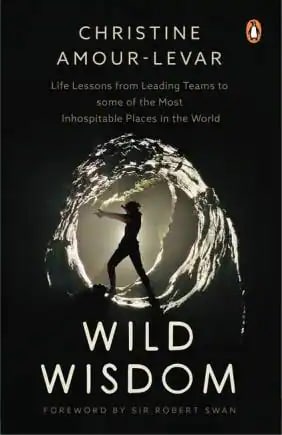This wisdom ain’t wild, it’s sobering!
This book is such a welcome break from what we know and the limited worlds we inhabit. It’s a reminder to step outside and try something new. “Choosing to do something outside of your comfort zone will ignite talents you didn’t know you had,” says the author. Fortunately, we know that whatever you choose, an entire ecosystem forms around your interests.
First up; I liked the author’s definition of success. She shares her journey, “I used to see success as a finish line, achieving a goal, a literal threshold at some point in time in the future…. success looks more like a continuous journey, everything is interconnected and it’s more worthwhile and important to strive forward at a steady pace and enjoy the ride.”
It is the good deeds of a handful that allow the majority to live carefree. The book talks about how in Kenya, at the Reteti Elephant Sanctuary, baby elephants are being devotedly taken care of and bottle-fed by local women, until they are big enough and old enough to be reintroduced into the wild. On average, elephants stay with their mothers for sixteen years. Wild Wisdom opens our eyes and our mind to the world beyond the daily realities we live in.
Five things readers are highly unlikely to forget.
1. The book wants you to take global warming seriously. The author says that if all of Greenland were to melt, it would raise sea levels by six metres, but if Antarctica were to melt, it would raise the sea level by sixty-five metres! Unfortunately, at the current rate, a land area housing 300 million people will be flooded annually by 2050, observes Christine.
2. Man made meats anyone? There are 23 billion chickens on our planet, raised to feed our human population. Hence, chickens are the most numerous land species on earth today. And they are seriously hungry, which means millions of acres of the most biodiverse rainforest have been replaced with field after field of chicken feed. We need to think of alternatives to the food choices we are making today.
3. The environment is a trillion dollar problem; and hence corporations have to get involved. ‘Mars Chocolates’ is a good example. Cocoa is one of their important ingredients. To ensure a stable supply of that crop for the long term, Mars has partnered with non-profits around the world who are working with small shareholder farmers to help them improve crop yields, making sure that they get a fair, premium and liveable wage.
4. The book also talks about Yvon Chouinard, the founder of Patagonia. Yvon asks of us, ‘Who are businesses really responsible to? Their customers? Shareholders? Employees? We would argue that it’s none of the above. Fundamentally, businesses are responsible to their resource base. Without a healthy environment, there are no shareholders, no employees, no customers and no business!’ Eerily true!
5. There is also a beautiful example of the coexistence of man and beast. The Samburu tribe of Northern Kenya depend on elephants to create paths to water and break branches that can be used for firewood. Notably, the author reminds us that in Africa and several other places, women are the natural custodians of the environment and the first to be affected by environmental degradation. This is because they are the ones who walk for hours looking for water, who fetch firewood and who provide food for their families. Notably, Christine has led several all-women expeditions to far flung places.
This book is a result of extensive travel, heart-wrenching experiences, an open mind and a never say die spirit. Author Christine Amour Levar has a complicated nationality – she is a ‘French Swiss Filipino’ adventurer – but her work belongs to the world. And when she earned the right to name two peaks in Antarctica; she selflessly and promptly christened one as ‘Mount Malala’, after the Pakistani Nobel Peace Laureate.
The book leaves you disturbed about sustainability and warm about the possibilities if we all came together; there is unity in the world and hope for us all. Because, “the happiest people are not those who wish they had more, but those who feel they have enough.”


